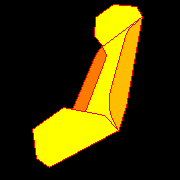Tumblewing

A tumblewing or "tumble wing" or "tumbling wing" is a glider or kite wing design which rotates about an axis transverse to the apparent wind, not necessarily horizontal. Tumble wings are frequently employed in wind turbines (such as the Savonius design), and are also used in some types of confetti.
Tumble wings may be made of any material that supports some stiffness for form, such as paper, plastic, metal, composites or wood. Many leaves falling from trees become tumble wing gliders.
Tumbling wings generate lift by alternately flying and stalling as the angle of incidence changes with the spinning motion (see magnus effect and flettner rotor). Its mode of flight is more akin to confetti than traditional fixed-wing aircraft; however, several model aircraft, such as flettner airplanes, have been built with tumbling wings for lift.[1] Tumble wings are employed as the wing of kite systems, a type of rotary kite, and many such patents exist.[2]
Because it does not need ballast, the tumblewing design has a lower wing loading and makes a good walkalong glider which is easy to make and fly.[3][4]
See also
[edit]- Controllable slope soaring – Type of slope soaring where a slope is made to follow a walkalong glider
- Gliding – Recreational activity and competitive air sport
- History of human-powered aircraft
- Orographic lift – Air mass forced upwards as it moves over rising terrain
- Ridge lift – Wind deflected upwards by an obstacle
References
[edit]- ^ US3380689A, Rudolf, Bucher, "Stabilizing system for aircraft", issued 1968-04-30 Archived 2022-08-28 at the Wayback Machine
- ^ "Patent US7621484: Rotor kite". Google Patents. 19 July 2007. Archived from the original on 26 October 2016. Retrieved 11 January 2021.
- ^ John M. Collins (2004). Fantastic flight. 10 Speed Press. pp. 122–126. ISBN 1580085776.
- ^ "How to build and fly a Big Mouth type tumblewing". Archived from the original on 2012-06-29. Retrieved 2012-07-15.
External links
[edit]- The Vortex I a Tumblewing Glider
- The Paper Airplane Guy teaches how to make the Tumbling Wing
- Tumblewing instructions from sciencetoymaker.org
- How to build and fly a Big Mouth type tumblewing
- How to fly a tumblewing type glider
- Video of Radio Controlled Airplane with tumbling wings
- Video of Dihedral Magnus Effect Glider
